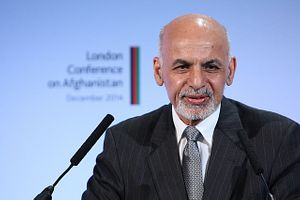Pakistan will be soon hosting a crucial regional conference in Islamabad. The conference will discuss the situation in Afghanistan with particular focus on helping the war-torn country’s economy, although the security situation will doubtless also be a major issue. More specifically, the meeting aims to look at ways to strengthen cooperation, deal with security challenges, and build economic ties.
The “Heart of Asia” conference is scheduled to run from December 8 to 10. Pakistan has been trying to convince Afghan President Ashraf Ghani to attend along with Prime Minister Nawaz Sharif. At the time of writing, official confirmation of the participation of Ghani as well as that of Indian Minister for External Affairs Sushma Swaraj was still pending. However, Ghani and Sharif did meet on the sidelines of the COP21 Climate Change Conference in Paris last week, a meeting mediated by British Prime Minister David Cameron and prompted by a recent visit to Kabul by Pashtun leaders from Pakistan.
Ghani’s courageous outreach to Pakistan following his inauguration suffered a huge setback when the Murree talks in July this year failed. Pakistan had promised the Afghan president that it would bring the Taliban leaders to the negotiating table, but the last minute confirmation of the death of Mullah Omar, the former spiritual head of the Taliban, not only derailed the talks but raised serious doubts about Pakistan’s intentions.
As the talks failed Kabul witnessed several major terrorist attacks – worse than it had experienced at any time over the past 14 yearss. The incidents prompted Kabul to rethink its approach towards Pakistan, deciding only to initiate talks with Islamabad when the latter was ready to talk honestly about peace in Afghanistan.
This week’s conference gives both Pakistan and Afghanistan a real opportunity to work out their differences and negotiate a settlement. The other key stakeholders, like Swaraj and Chinese Minister of Foreign Affairs Wang Yi, along with senior representatives from Azerbaijan, China, Iran, Kazakhstan, Kyrgyzstan, Russia, Saudi Arabia, Tajikistan, Turkey, Turkmenistan, and the UAE could also use this platform to pressure Afghanistan and Pakistan to reach a peace settlement with insurgent groups on both sides of the border.
Spoilers
However, before the conference even gets underway, spoilers are at it once again, proclaiming the death of Mullah Akhtar Mansur, who succeeded Mullah Omar as head of the Taliban, hoping to overshadow the conference and ensure participants leave empty handed. (In fact, the fate of the Taliban leader remains unclear.)
In this environment of mistrust and with a lack of conviction in Pakistan and Afghanistan, what should the two nations – together with the international community – do to ensure peace and reconciliation with insurgent groups? Since the ball is in Pakistan’s court, and since Islamabad wants to have full control over the peace and reconciliation talks and their outcome, then it would seem to be up to China, which is likely to be playing a major role for years to come in the region, to push Pakistan to bring Taliban elements to the table and make peace with Afghanistan.
Pakistan should be aware that the presence of Tehrik-e-Taliban Pakistan (TTP) in areas along the borders of the two countries, will have negative implications for Pakistan. The more the Pakistanis support the Haqqani Network and the Taliban in weakening the Afghan state, the more safe havens there will be in Afghanistan for the TTP to attack Pakistan. Last year’s devastating attack on Army Public School in Peshwar was the work of these groups along the border.
On the other side, the government of Afghanistan should avoid pursuing irresponsible and irrational anti-Pakistan agendas, blaming Pakistan for every terrorist incident. The Afghan government should also provide short-term economic stimulus focused on job creation combined with government reforms, limiting opportunities for young Afghans to be recruited by insurgent groups and stopping the exodus of young Afghans from the country.
The international community must also do its bit in bringing peace to Afghanistan. The current level of financial support for the Afghan security forces must be sustained, with the U.S taking the lead also in training, advising and assisting the Afghanistan National Security Forces (ANSF). These steps are needed to maintain both the morale of the Afghan forces and the military pressure that has helped bring the Taliban to the negotiating table. The international community should help the government of Afghanistan to nurture an Afghan counterterrorism policy, supported by international intelligence, surveillance and reconnaissance, and close air support to deny sanctuaries to insurgent groups in Afghanistan and the region and to encourage reconciliation.
Last but not least, peace in Afghanistan could create opportunities for greater economic links between Central Asia and South Asia. As a landlocked country, Afghanistan has been conducting its foreign trade largely through Pakistan. For its part, Pakistan could use Afghanistan for its trade with Central Asia and, more importantly, for bringing electricity and gas from Tajikistan, Turkmenistan and Uzbekistan into South Asia.
If the current leadership in Afghanistan and Pakistan could take real steps to bring the insurgent groups to the negotiating table so that peace might prevail, then the region has tremendous potential for economic growth. The U.S, China and India all have a crucial role to play in making this happen.
The conference in Islamabad is an opportunity for a fresh start, and a chance to out-flank the “spoilers” on both sides and produce a far-sighted vision for the region, producing strategies for achieving lasting peace and prosperity.
Habib Wayand is a Yale World Fellow and a freelance political and security analyst currently based in Kabul, where he leads a consulting firm. He previously worked with the Government of Afghanistan as senior advisor to the Minister of Rural Rehabilitation and Development, Minister of Education and Minister of Interior.
































